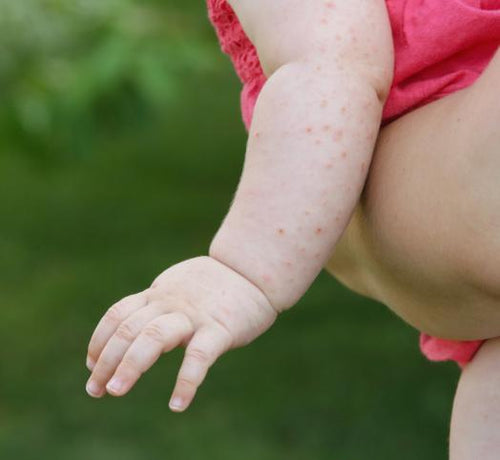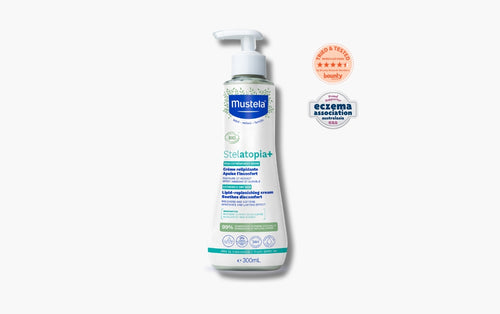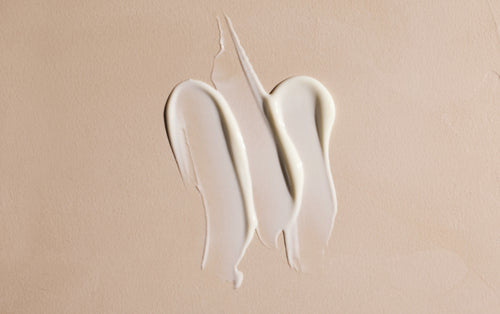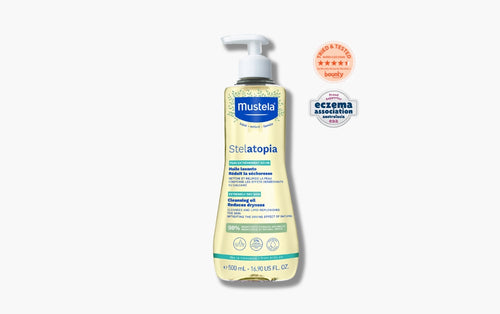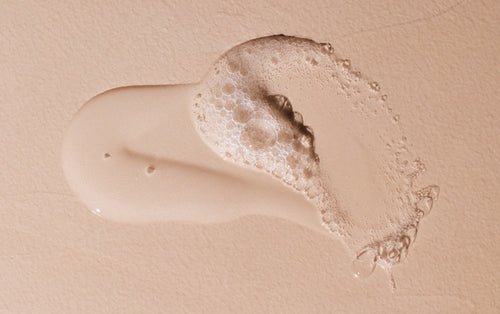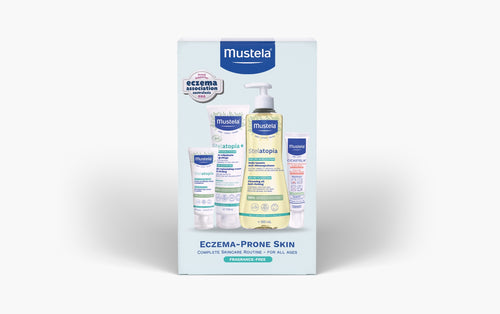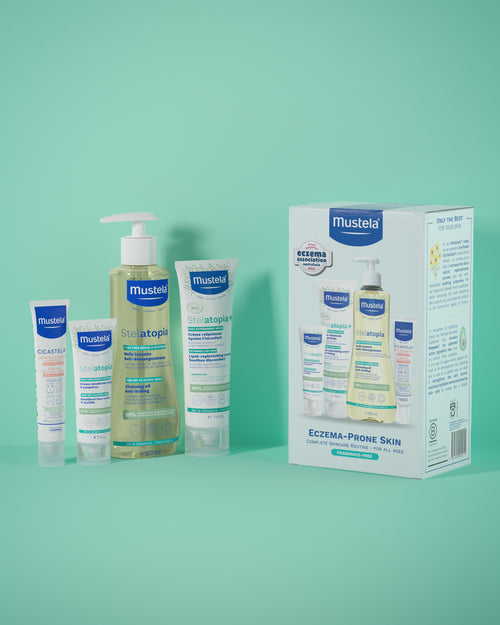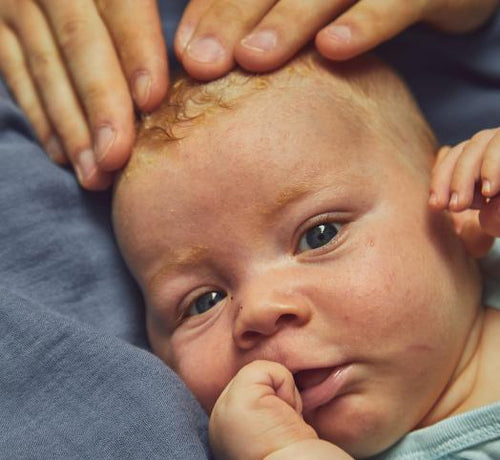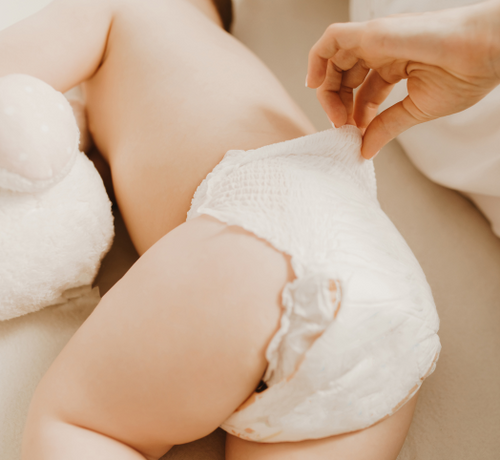1. Atopic Dermatitis
Atopic dermatitis is the most common type of eczema. It often starts in childhood and may continue into adulthood.
Causes:
- Likely due to a combination of genetics, dry skin, an autoimmune disorder, and environmental triggers.
Symptoms:
- Itchy skin
- Rash on the inside of elbows or backs of knees
- Rash on a baby’s scalp or cheeks
- Thicker or discolored skin
- Rash that bleeds or leaks fluid when scratched
- Easily infected skin
- Difficulty concentrating or sleeping due to itching
Treatment:
- There is no cure, but treatments include topical steroid or non-steroidal creams.
- Natural approaches: use a moisturiser specifically for eczema-prone skin, like Stelatopia+ Lipid-replenishing Cream , bathe carefully, and dress in soft, breathable clothing.
2. Contact Dermatitis
Contact dermatitis occurs when your skin reacts to something it has come into contact with.
Causes:
- Allergic reactions or irritation from substances like laundry detergent, bleach, soap, nickel, wool, poison ivy, synthetic fragrances, perfume, and latex.
Symptoms:
- Itching, stinging, or burning
- Dryness or cracking
- Redness
- Hives
- Blisters
Treatment:
- Avoid the irritant.
- Your doctor may suggest steroid creams or oral corticosteroids for severe cases.
- Use hypoallergenic products like Mustela's Stelatopia Cleansing Gel and Stelatopia Cleansing Oil.
3. Nummular Eczema
Nummular eczema causes round, coin-shaped red marks on the skin.
Causes:
- Exact cause unknown, but triggers include dry skin, stress, soap, surgery, scrapes, and bug bites.
Symptoms:
- Circular patches that can itch or ooze
- Spots typically on arms or legs, but can be elsewhere
- Spots that are red, pink, or brown and scaly
Treatment:
- See a dermatologist for proper diagnosis and treatment, which may include topical corticosteroids or antibiotics.
4. Neurodermatitis
Neurodermatitis involves a cycle of itching and scratching, which worsens the itching.
Causes:
- Unknown, but more common in women, adults aged 30-50, people with anxiety disorders, and those with other types of eczema.
Symptoms:
- One or two itchy patches
- Dry, thick, scaly skin
- Patches that bleed when scratched
- Increased itching when stressed or anxious
Treatment:
- Topical steroids or non-steroid creams, oral medication, relaxation techniques, and counseling.
- Use fragrance-free moisturisers like Stelatopia+ Lipid-replenishing Cream
5. Seborrheic Dermatitis
Seborrheic dermatitis affects the scalp, known as dandruff in adults and cradle cap in babies.
Causes:
- Thought to be an inflammatory reaction to Malassezia yeast, with possible links to hormone levels, oily skin, and genetics.
Symptoms:
- Skin flakes
- Oily skin with white or yellow scales
- Redness and swelling
Treatment:
- Use gentle creams and shampoos like Newborn Foam Shampoo and Cradle Cap Cream for babies.
- Adults may need antifungal cream, steroid cream, or medicated shampoo.
6. Stasis Dermatitis
Stasis dermatitis, also known as gravitational dermatitis or venous eczema, relates to poor blood flow in the legs.
Causes:
- Fluid leaks from veins and accumulates under the skin, often due to poor circulation.
Symptoms:
- Swelling in lower legs or ankles
- Orange-brownish spots
- Discoloration
- Varicose veins
- Sores on lower legs or feet
Treatment:
- Address the underlying cause, and your doctor may prescribe antibiotics or steroids.
- Wear compression socks and elevate your feet.
7. Dyshidrotic Eczema
Dyshidrotic eczema causes small, itchy blisters on hands and feet.
Causes:
- Unknown, but triggers include allergies, stress, metals, heat, and humidity.
Symptoms:
- Itchy or painful blisters
- Patches on palms, soles of feet, and sides of fingers and toes
- Red, dry, cracked, or scaly skin
Treatment:
- Follow a specific regimen or take medications if caused by a fungal infection.
- Wash skin, pat dry, and use a gentle moisturizer, reduce stress, avoid triggers, and apply cold compresses.
Natural Care for Eczema
Regardless of the type of eczema, there are natural ways to care for your skin. Steroid creams have side effects, so after consulting with your doctor, use gentle products like Mustela's Stelatopia+ Lipid-replenishing Cream. The Stelatopia range is dermatologist tested, vegan, fragrance-free, and made with natural ingredients to soothe and replenish eczema-prone skin.
By understanding the causes, symptoms, and solutions for the seven types of eczema, you are better equipped to protect yourself and your family.





